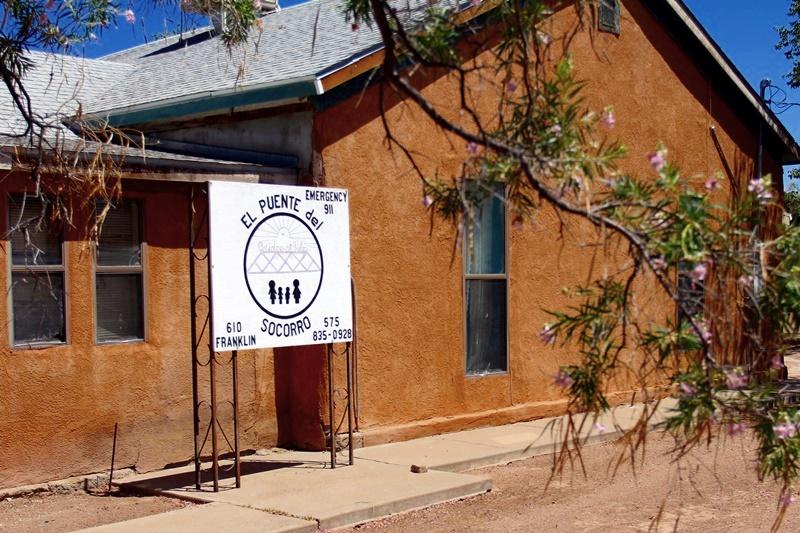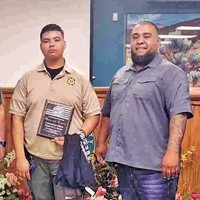
El Puente del Socorro
This story includes descriptions of domestic violence and sexual assault. A pseudonym was used for the woman who shared her story due to its sensitive nature.
On her wedding day, Jane Smith wore black tights to cover the bruises on her legs.
“It doesn’t start as a punch and love. That’s not how it works. They hide who they really are, until they think that they have you so vulnerable that they can just walk right over you,” she said.
Smith met her abuser when she was in a vulnerable moment in life: She was dealing with issues from childhood and trying to overcome a drug addiction.
“It was honeymoon for the first two months and then New Year’s for 2010 — that is a night I never want to repeat ever again in my life, and there’s some of those in there, but that night is the night where I should have left,” she said.
Her partner beat Smith until she passed out in front of his home. When she came to and returned inside, he proceeded to drug her, beat her and lock her in the bedroom.
Then he went back downstairs to visit with friends. After they passed out drunk, he came back into the room and raped her. It was also the first, but not last, time that he cut her, making long cuts on her stomach.
“At the time I weighed 120, 125, and I had an anorexia problem, so it was very easy for him to break me. That was the night that I should have left, but the next morning, the next week, he bought me my favorite cigarettes, which were expensive as shit, $15 a pack,” said Smith.
The week after that initial assault, he pampered Smith, taking her to the movies, rubbing her feet after she got off work, giving her shoulder massages and buying her dinner.
“And I thought, ‘OK, maybe this was just a one-off. We were both drinking. OK, it’s a one off.’ No,” she said.
By the time Valentine’s Day rolled around, Smith had been beaten again and left to nurse bruised ribs, a broken toe and a bloody lip. Again, the day after assaulting her, Smith’s abuser lavished her with gifts and attention: a new wallet, chocolate, breakfast in bed. A week later, he beat her for eating the last of the chips.
By July, Smith and her abuser were getting married.
“I was told when my wedding was going to be. I was told who was going to be invited. I was told the only thing I could do about it was pick my dress and how I wanted my hair. He beat me four days before the wedding,” she said.
The abuse continued to escalate after the couple married.
“I was told, ‘Well, now that we’re married, I don’t have to ask you to have sex. I can just take it,’” she said.
Smith believes her substance abuse made her more vulnerable to an abusive partner, a pattern she’s also seen play out in the lives of friends.
“When you’re trying to come down off drugs, you think you’ll never find anybody. You think that nobody will ever love you,” she said. “Then when you get into a relationship with that kind of mindset, it all just kind of clicks of, ‘Oh, well, this is the best I’m going to get. This is what I deserve because I did so many bad things.’
“Because I’m not going to lie, there are several things that I should have gone to jail for that I did not, but there are also several things that I should have sent him to jail for that I didn’t. And he’s got to live with that. I have to live with the PTSD for the rest of my life.”
She said that when her partner began abusing substances, it exacerbated the violence. This is another pattern she’s seen play out in the lives of friends. Although Smith was able to stop abusing substances during the relationship, it was a challenge.
“Sometimes drugs and alcohol are the only things that help with the pain, and it isn’t until you leave and sober up that you can get better,” she said.
The years of physical abuse left Smith on disability and affected her fertility.
“When I finally got to see a gynecologist, they told me, ‘You’re probably never going to be able to have kids,’ and I said, ‘OK.’ OK. It wasn’t devastating at the time,” she said. “It is now because it’s like, ‘Shit, he took that away from me, too.’ … But at the time, it was just one more punch. One more blow.”
Smith was married three years before separating from her ex-husband.
When she left the relationship, her ex-husband continued to harass her, showing up drunk at her workplace, slashing her tires and stealing her wallet. He also told family members she had been the abuser.
One reason Smith stayed with her abuser was the fear of what her ex might do to her cat if she left. Fear for her cat’s wellbeing is also what made her finally decide to leave. The abuse included harming the cat. In 2013, that animal abuse escalated, and Smith had enough of watching her cat suffer.
“If it hadn’t been for my cat, I would probably still be putting up with his alcoholism. I would probably still be putting up with his drug abuse,” she said.
The cat lived for six more years after she left the abusive relationship. Although Smith still deals with PTSD and is unable to work, she shares a happy home with her three cats and a new partner.
How common is domestic violence?
In 2019, New Mexico saw 15,524 reports of domestic violence incidents perpetrated by an intimate partner, according to an analysis of domestic violence trends in the state from the New Mexico Interpersonal Violence Data Central Repository.
In New Mexico, 37.6 percent of women and 33.3 percent of men experience intimate partner violence in their lifetime. This rate is 0.3 percent higher for women and 2.4 percent higher for men than the national rate.
An average of 19,000 domestic violence incidents were reported annually in the state from 2015-19. The report estimates that 50,000 men and 54,000 women experienced intimate partner violence in New Mexico in 2019.
According to the report, Socorro County ranked 14th in the state for its rates of reported domestic violence per 1,000 people in 2019. The county’s rate was 7.3, compared to the statewide 11.6.
In 2016, Socorro County ranked fifth in the state, at a rate of 10.8 reported incidents per 1,000 people.
In 2019, 43 percent of domestic violence cases involved alcohol or drug use in Socorro County, compared to 29 percent statewide. The percent of domestic violence cases with injury in Socorro County was at 39 percent in 2019, compared to 48 percent statewide.
In 2021, Socorro domestic violence shelter El Puente del Socorro averaged 15 new survivors and two to three new offenders per month in its program, according to Director Johnnie Trujillo.
Where to find help
El Puente del Socorro has operated since 1987 and works with domestic violence survivors and offenders. The crisis line is 575- 835-0928.
El Puente can help set up safety plans, assist in filing orders of protection and going to court with survivors. They can also help survivors with shelter, counseling, crisis intervention and other services.
El Puente runs an offender program that offers group counseling to help change abusive behavior. That’s important, said Director Johnnie Trujillo, because even if the abusive relationship has ended, the person who perpetrated the violence may walk into the next relationship with the same beliefs and behaviors, making someone else a victim.
Both abusers and victims can come from all walks of life.
Casa de Luz is a family advocacy center contracted with the state Children, Youth and Families Department to provide community-based prevention, intervention and reunification services. Its goal is to prevent child abuse and maltreatment.
Casa de Luz can help with individual or family counseling, parenting education and strategies, life skills and sometimes accessing inpatient services.
Staff members do their best to avoid further traumatizing children by taking them from their home. If it’s necessary to take a child out of their home, they try to place the child with extended family or fictive kin, someone the parents or children already have a strong relationship with.
There is a SANE unit in Los Lunas, offering comprehensive care and forensic exams to sexual assault victims. SANE stands for sexual assault nurse examiner.
The unit is based in the Valencia Shelter Services’ office at 445 Camino del Rey SW, Ste. E. The unit can also refer victims to therapy, legal advocacy and physicians.
If you need SANE services, call 505-884- SANE (7263).
Services are always confidential, free and available 24 hours a day.






















